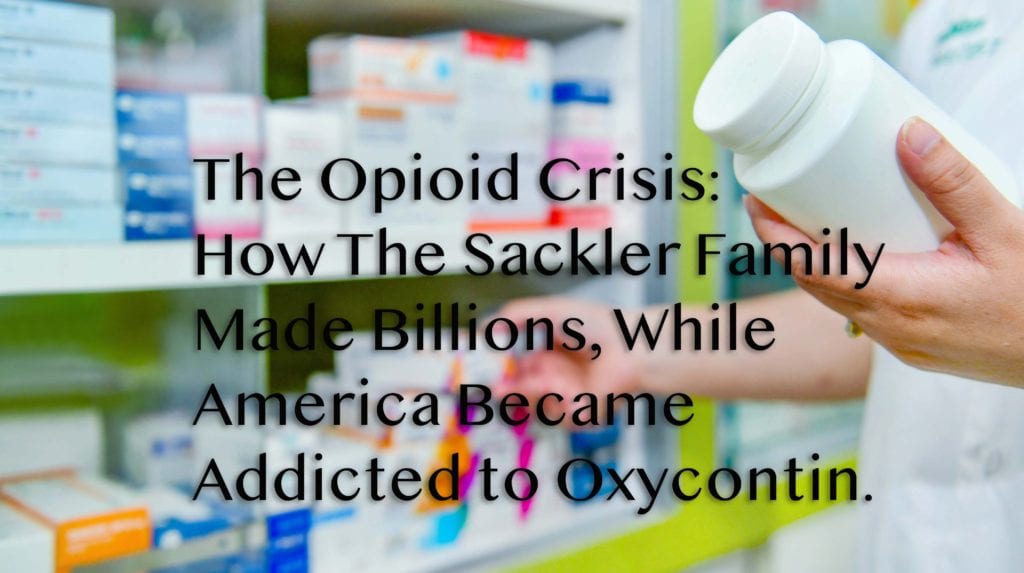
The Sackler family, owners of Purdue Pharma, the company that makes Oxycontin is coming under a lot of intense legal pressure. As the opioid crisis wages on in the United States, the legal battles will likely ramp up in the years to come. While these ongoing lawsuits are being played out however, the opioid epidemic continues to kill 130 people per day. More than 1,000 government entities have sued Purdue Pharma along with other prescription drug makers, claiming they are responsible for the increase of overdose deaths that have plagued this nation for the greater part of the last two decades.

In January of 2019, a Massachusetts lawsuit publically brought out documents that show members of the Sackler family were well-aware of the abuse potential of their products. Court documents state: “Purdue Pharma created the epidemic and profited from it through a web of illegal deceit.” The documents also show that along with complacency of the family, (many of whom also serve as the board of directors) Purdue intentionally tried to hide the negative effects of their drugs from the public and the government. Further allegations in the case suggest that the Sackler family overwhelmed the medical industry in the state with aggressive sales representatives to promote their drugs. Furthermore, as part of an ongoing strategy, Purdue successfully influenced state legislation to protect their economic interests in the state.
The Sackler family is widely known as ardent philanthropists. They regularly donate to art and history museums, universities and medical facilities to put a positive spin on the family name. This was achieved through various public relations campaigns, including charitable donations to educational institutions and art museums. These donations to medical universities enabled the makers of Oxycontin to obtain good faith from aspiring, young doctors who would have a favorable view of opioids upon graduating with their medical degree. These favorable views of opioid use in pain treatment would garner lavish financial returns, as there would be more and more prescribing of the patented drugs. Many would argue that under the guidance of the Sackler family, the aggressive marketing tactics of Purdue Pharma really helped ignite America’s current opioid crisis. The Massachusetts lawsuit claims that when patients showed signs of addiction to their doctors, Purdue actually urged the doctors to increase the patients’ dosage. Richard Sackler has been shown in internal documents to push the narrative that people who became addicted were the ones to blame for their substance abuse.
“We have to hammer on abusers in every way possible. They are the culprits and the problem. They are reckless criminals.”
–Richard Sackler in a 2001 email, while president of Purdue Pharma
While the Sackler family was pushing blame onto people who helplessly became addicted to their drugs, they raked in billions and billions of dollars. The family fortune is said to have exceeded $13 billion dollars at the end of 2018. While the Sackler family was making their fortune in the last two decades, over 200,000 people have died in the US as a result of prescription opioids since 1996. It was in the late 1990’s when Purdue began their aggressive marketing Oxycontin to doctors and the public.
The sales of Oxycontin rapidly increased over the years, while the Sackler family pushed a multitude of false information about their products. The company actually began marketing Oxycontin as a drug that was non habit-forming. Purdue claimed that since the drug was slow acting and long lasting, drug addicts wouldn’t use the drug to get high. The company’s sales representatives pushed a claim that the drug had a dependency rate of “less than one percent” which had no basis in scientific research or fact. They just told doctors this in an attempt to market their product as safe.
Marketing opioids: making billions of dollars off of human suffering and death.
The problems with marketing of the opioids were in the aggressive nature Purdue sought massive profit margins. Internal Purdue memos sought to sell higher doses of the drugs over long periods of time. This obviously made the company more money, while the higher doses also increased the likelihood of their patients to develop an addiction. Many internal emails have proven that the Sackler family cared only about their sales numbers, not the safety of the patients who were taking the drugs. These accusations led to a 2007 federal court case, in which the family voted to plea guilty to misleading marketing practices. The court case did not hold any individual in the Sackler family accountable, nor did it force any legal penalties on them individually. Purdue Pharma was simply ordered to pay $600 million in fines.
The federal case was supposed to curb the aggressive marketing of the drug, while also removing the Sackler family from direct involvement in decision making. This did not happen as recent court documents have proven. The June, 2018 Massachusetts court case proved that the family was still heavily involved in marketing, claiming they put profits over people. Various other states, including Ohio are also seeking litigation regarding the Sackler family’s responsibility in the ongoing opioid epidemic.

The Sackler family: profiting from the response to problems they created.
To further matters, Richard Sackler was awarded a patent for an opioid addiction treatment drug, a version of buprenorphine that dissolves rapidly. Many see this patent as a way for the Sackler family to profit off of the problem they helped create. This is considered a bold move by some, as the company stands to make even more money off of the addicts they helped to create.
Treatment and drug rehab for addicts is the best response to the opioid epidemic.
While many are hoping these lawsuits may help bring about funding for more access to treatment options, the fight will be a long, contentious one. Purdue claims to be on the frontlines of combating the opioid crisis, working with the FDA, law enforcement and prescribers to limit exposure to the potentially deadly drugs. As patients see their prescriptions expire, there are many people who continue to be addicted to the drug. One Oxycodone pill can get as much as $80 on the streets, so these addicts will often turn to cheaper, illicit street drugs like heroin in an effort to simply quell their painful withdrawal symptoms.
Heroin is cheaper and easier to obtain for many opioid-addicted patients. The people who become addicted simply cannot just quit cold-turkey when their prescription runs out. As they find street drugs to alleviate their withdrawal symptoms, they are being exposed to dangerous cocktails of fentanyl and heroin and other substances that are prone to causing drug overdoses. This epidemic is killing thousands of Americans every single year in the US. One thing that is missing from Purdue’s response to the crisis is increased support and access to addiction treatment programs and drug rehab.
Many Americans simply cannot wait for addiction treatment. The disease of addiction is a strong one, but treatment is available. 10 Acre Ranch offers a comprehensive treatment program for opioid abuse beginning with a fully-supervised medical detox. This helps our clients fully-recover from the drug addiction, as they are monitored by our licensed medical staff, navigating the dangerous stages of their withdrawal symptoms. Our inpatient facility treats each individual with a personalized approach with therapy suited to their unique needs. Ongoing outpatient treatment and 12-step meetings are supported through our comprehensive, evidence-based rehabilitation program.
If you, a family member or loved one needs help with their addiction, please don’t hesitate to call us today:




